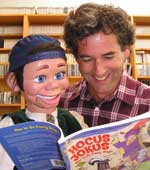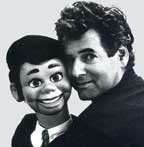Childrens Music Portal
An Audience Of Children
An Audience Of Children
sharing knowledge,
cultivating resources
cultivating resources
THREE TECHNIQUES FOR BEING A FUNNY SUCCESS IN FRONT OF AN AUDIENCE OF CHILDREN
In this essay I’ll be discussing three aspects of performing for children. They are:
A. All kids laugh at the same stuff
B. Always treat kids as equals
C. Never worry about material going over their heads.
A. ALL KIDS LAUGH AT THE SAME STUFF
People are always impressed that I entertain children. They often ask, “Aren’t they a lot more difficult than performing for adults?” No. Once you have the key for making children love you, it’s the same key for all children.
There are dozens of different adult audiences but only one children’s audience. What I mean is, that a group of drunken college skiers at a midnight show is going to have very different taste than senior citizens in a nursing home in Florida. 24 year olds laugh at different material than 54 year olds. There are cultural differences, religious differences, sexual differences, economic differences. What tickles one audience offends another. What leaves one audience rolling on the floor leaves another cold.
And adults have a whole array of emotions. They can be uptight. They can be polite. They may think something is funny but refuse to laugh because they don’t want to stand out. They can feel sorry for you and politely applaud even though they think you suck. They can be patronizing. They can feel sorry for you. They bring baggage to the show. In other words, the entire complexity of human emotion.
Now kids, ah, that’s another story entirely. Every child has the same sense of humor. Every children’s audience acts the same way. Find the key to make one kid laugh and you can make any kid laugh on the planet. For instance, look into a child’s eyes, pause for two seconds to get their attention and then say.. “Doody!”. She’ll laugh. Bellybuttons, armpits, boogers, tickling, bald heads, bananas. These are all keys to what all kids find are funny. Anything silly, irreverent or exaggerated is grist for the mill. I once tested this out when I had a performance in West Africa. I went up to a kid in Accra, looked him in the eye and said “Poopy!”. He didn’t even know what it meant. But he laughed!
Kids are never polite in an audience, they’re never offended, they’re never patronizing. They’re pure, innocent, naïve, wonderful creatures. They may be abusive, out of control and bratty but only if your performance isn’t up to par. They don’t have much patience and don’t suffer fools gladly. I love them for this.
B. ALWAYS TREAT KIDS AS EQUALS
The other trick to getting kids on your side in a performance is to never be patronizing. Never talk down to them. Treat them like equals and they’ll love you forever.
Do I like kids? I always thought that was a strange question. Some kids I like, some I don’t. You might as well ask if I like grown-ups. In other words, it depends on the kid.
Because I’ll treat a kid as an equal, they have a responsibility to act like one (up to a point of course, I do allow lots of leeway..after all, they’re just kids!). But children who act up in the audience are quickly dealt with. One doesn’t get a free pass because one is a child. Just as you wouldn’t allow an adult in a Broadway audience to ruin the play for everyone, it’s unfair to any audience to allow a child to sabatoge your show. In the long run, kids will respect you for this. There are many ways of dealing with kids when they act out so you don’t break character, but that’s the subject for another essay.
I never address my audience as “Now boys and girls”. I might say “Now kids..” or “Hey gang..” or “Listen you little pipsqueaks..” As long as you stay informal, relaxed and act like a friend not an authority figure, you’re in like Flynn.
C. NEVER WORRY ABOUT MATERIAL GOING OVER KIDS’ HEADS
As a performer I never worry about going over the kids’ heads. I often hear adults worried that a kid might not understand the joke you’re telling. Let me tell you this; It’s the job description of a kid to be a sponge. All day long they’re meeting situations they don’t fully understand. It’s all right. In fact, if they think they’re listening to something cool, they have no qualms about getting only 50 percent of something.
When I was a child I LOVED Allan Sherman. Sherman had an album called “My Son, the Folksinger”. Great album. Funny as hell. And I understood maybe a quarter of it. But it didn’t matter. I heard the audience laughing. What I got, I loved. The rest could wait. And as I got older I understood more and more of it. Kids will love you if you try to bring them up to your level, instead of going down to theirs.
Of course, being kids, I don’t get political, sexual or violent. They’re not interested in that stuff anyway (not real violence, maybe cartoon bopping). And when adults approach me afterwards and say “Gee, I laughed as hard as the kids” I say “That’s because I don’t do anything I don’t think is funny myself. Since I’m an adult and I’m laughing, you are too”.
So in summary, the three techniques are; Be silly and irreverent, treat them like peers and don’t worry if they don’t understand all your material. If you do these three things, they will never let you down.
(Steve Charney is one of our select artists with a cd in The Portal Store and tracks in the Listening Room)



Childrens-Music.org